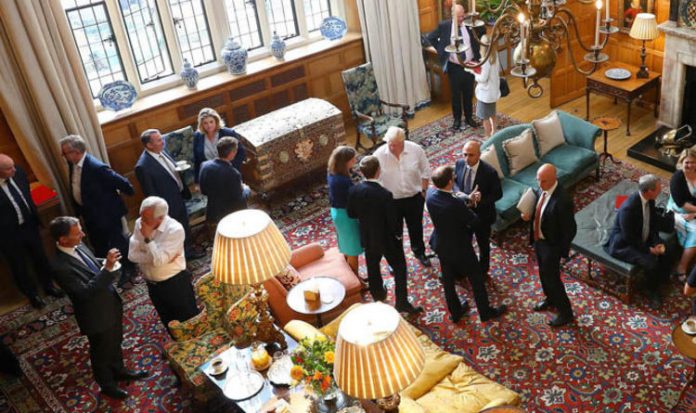[ad_1]
She said: “Now we must all move at pace to negotiate our proposal with the EU to deliver the prosperous and secure future all our people deserve.”
But she was braced for an angry backlash from Eurosceptic Tory MPs after the deal proposed a “free trade area for goods” that will mean the UK adopting many EU rules and regulations.
Her blueprint also included a role for the EU’s Court of Justice as an “interpreter of EU rules” in the UK after Brexit.
In a warning to Brussels, the Cabinet also signalled that the Government will step up preparations for quitting the bloc without a deal unless EU negotiators are ready “to reach agreement on a good and sustainable future relationship”.
Brexit-backing ministers are understood to have pressed the PM into two major concessions in the plan.
Boris Johnson demanded a guarantee that legal cases over breaches of EU rules in the UK cannot be referred to the Court of Justice.
And several Eurosceptic Cabinet ministers insisted the document explicitly spelled out a “parliamentary lock” to ensure that new EU rules cannot come into force unless they are approved by MPs.
A senior Government source at Chequers said: “It’s been a long, hot day but all’s well that end’s well. It’s been very good humoured – there were even a few gags.”
The talks began with a lengthy question-and-answer session with senior officials in the main hall at Chequers before ministers headed to a terrace outside for a buffet lunch.
Mrs May faced down a threatened revolt by up to seven Eurosceptic Cabinet ministers by daring her critics to walk away.
In an extraordinary move the Prime Minister signalled her readiness for an emergency reshuffle to “bring on talent” if any rebels quit.
In a statement released as 12 hours of intense talks drew to a close, Mrs May said: “Today in detailed discussions the Cabinet has agreed our collective position for the future of our negotiations with the EU.
“Our proposal will create a UK-EU free trade area which establishes a common rule book for industrial goods and agricultural products. This maintains high standards in these areas but we will also ensure that no new changes in the future take place without the approval of our Parliament.
“We have also agreed a new business-friendly customs model with freedom to strike new trade deals around the world. Next week we will be publishing a White Paper which will set out more details of how we will be taking back control of our money, laws and borders.”
A joint statement signed by the Prime Minister and all 22 Cabinet ministers put forward a plan for an “economic and security partnership” with the EU.
“At the core of this proposal is the establishment by the UK and the EU of a free trade area for goods,” it said.
“This would avoid friction at the border, protect jobs and livelihoods, and ensure both sides meet their commitments to Northern Ireland and Ireland through the future relationship.”
The plan included both sides adopting a “common rulebook for all goods” including agricultural produce.
It would mean Britain volunteering “to commit by treaty to ongoing harmonisation with EU rules on goods, covering only those necessary to provide for frictionless trade at the border”.
The EU’s Court of Justice will play a role in enforcing EU regulations in the UK through a “joint committee”.
The document insisted the court could be an “interpreter” of the rules but “cannot resolve disputes”.
In a warning shot to the European Commission’s negotiating team, the document concluded the Government will “continue preparations for a range of potential outcomes, including the possibility of no deal”.
It added: “Given the short period remaining before the necessary conclusion of negotiations in the autumn, we agreed preparations should be stepped up.”
[ad_2]







